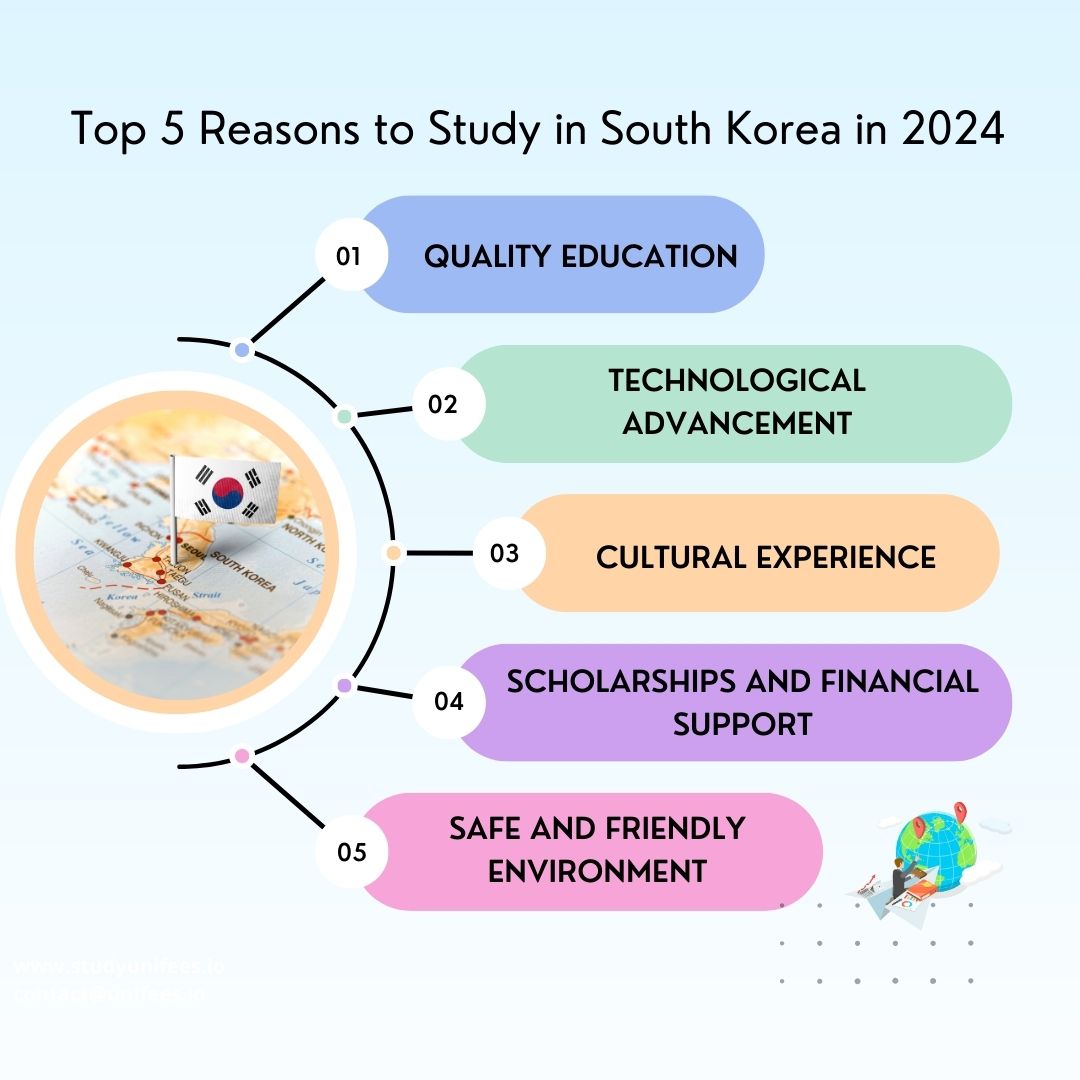Study in South Korea: Why South Korea is the Next Big Study Abroad Destination

In recent years, South Korea has become a popular place for international students who want a great education abroad. More and more students are choosing to study in South Korea, showing its rising status as a top education destination. This article will look at why this is happening, the strengths of South Korean education, and give details about the best universities in the country.
Growth in International Students Choosing South Korea
South Korea has experienced a significant increase in international students over the past decade. According to the Ministry of Education, the number of international students in South Korea has more than doubled from 84,000 in 2010 to over 170,000 in 2020. This growth is global, attracting students from various continents to study in Korea.
Statistics by Region
- Asia: Students from neighboring Asian countries, such as China, Vietnam, and Mongolia, constitute the largest group of international students in South Korea. In 2020, Chinese students alone accounted for approximately 44% of the total international student population in South Korea.
- America: There has been a noticeable increase in students from North and South America. The number of students who want to study in Korea from the United States has grown by 15% over the last five years, while students from Brazil and Mexico have also shown a significant rise.
- Europe: European students who want to study in Korea are increasingly looking towards Asia for higher education opportunities. Countries like Germany, France, and the United Kingdom have seen a steady increase in the number of students opting to study in Korea.
- Africa: While still a smaller percentage compared to other regions, the number of African students studying in Korea has been growing, particularly from countries such as Nigeria, Kenya, and Egypt.
- Middle East: Students from the Middle East, especially from countries like Saudi Arabia and Iran, are also exploring educational opportunities in South Korea.
Reasons to Study in South Korea

Several factors make South Korea an attractive destination for international students. Here are some of the primary reasons:
- Quality Education: South Korea is renowned for its rigorous education system and academic excellence. The country boasts several top-ranked universities that offer a wide range of programs in various fields. The emphasis on research and innovation attracts students looking for a robust educational experience.
- Technological Advancement: South Korea is a global leader in technology and innovation. The country’s advancements in fields such as information technology, engineering, and robotics provide students with access to cutting-edge facilities and resources. This technological environment is particularly appealing to students in STEM fields.
- Cultural Experience: South Korea’s rich culture and history offer international students a unique and immersive experience. From traditional festivals and cuisine to K-pop and modern entertainment, South Korea provides a vibrant cultural landscape that enriches the study abroad experience for students who want to study in Korea.
- Scholarships and Financial Support: To attract more international students who want to study in Korea, South Korean universities and the government offer various scholarships and financial aid programs. These scholarships can significantly reduce the financial burden on students, making it more feasible to study in Korea.
- Safe and Friendly Environment: South Korea is known for its safety and hospitality. The low crime rates and friendly local population create a welcoming environment for international students. Additionally, many universities have support services and programs specifically designed to help international students adapt to life in Korea.
South Korean Higher Education
South Korean higher education is characterized by its focus on quality, research, and innovation. The country has a well-established higher education system that includes both public and private universities, offering a wide range of undergraduate, graduate, and doctoral programs.
Key Features
- Rigorous Academic Standards: South Korean universities maintain high academic standards, ensuring that students receive a quality education. The rigorous admission processes and competitive nature of these institutions reflect their commitment to excellence.
- Research and Development: South Korea places a strong emphasis on research and development. Universities often collaborate with industries and government bodies to conduct cutting-edge research, providing students with opportunities to engage in innovative projects.
- Global Partnerships: Many South Korean universities have established partnerships with institutions worldwide. These collaborations facilitate student exchanges, joint research projects, and global networking opportunities.
- English-Taught Programs: To cater to international students, a growing number of South Korean universities offer programs taught in English. This helps overcome language barriers and makes it easier for non-Korean-speaking students to pursue their studies.
Top 10 Most Reputed Universities in South Korea
Here are the top 10 most reputed universities in South Korea, along with a description of each and their most popular courses for international students:
- Seoul National University (SNU)
- Description: SNU is South Korea’s premier national university, known for its comprehensive academic programs and research excellence. It consistently ranks among the top universities in Asia and the world.
- Popular Courses: International Relations, Business Administration, Engineering, Korean Language and Literature, Biological Sciences.
- Korea Advanced Institute of Science and Technology (KAIST)
- Description: KAIST is a leading science and technology university, renowned for its cutting-edge research and innovation. It offers a dynamic and rigorous academic environment.
- Popular Courses: Computer Science, Mechanical Engineering, Electrical Engineering, Chemical Engineering, Industrial Design.
- Yonsei University
- Description: Yonsei University is one of the oldest and most prestigious private universities in South Korea. It offers a wide range of programs and has a strong emphasis on liberal arts education.
- Popular Courses: Business Administration, Economics, International Studies, Psychology, Medicine.
- Korea University
- Description: Korea University is a major private research university, known for its strong academic programs and vibrant campus life. It has a diverse student body and extensive global partnerships.
- Popular Courses: Political Science, Law, Business Administration, Sociology, Life Sciences.
- Pohang University of Science and Technology (POSTECH)
- Description: POSTECH is a top-tier research university specializing in science and engineering. It is known for its small class sizes and personalized education approach.
- Popular Courses: Materials Science, Computer Science, Mechanical Engineering, Physics, Chemical Engineering.
- Hanyang University
- Description: Hanyang University is a comprehensive private university with a strong focus on engineering and technology. It has a reputation for fostering innovation and entrepreneurship.
- Popular Courses: Architecture, Biomedical Engineering, Business Administration, Civil Engineering, Information Systems.
- Sungkyunkwan University (SKKU)
- Description: SKKU is one of the oldest universities in East Asia, with a rich history and a strong focus on modern research and education. It is known for its collaborative industry partnerships.
- Popular Courses: Software Engineering, Business Administration, Nanotechnology, East Asian Studies, Biomedical Sciences.
- Ewha Womans University
- Description: Ewha Womans University is one of the most prestigious women’s universities in the world. It offers a wide range of programs and has a strong commitment to women’s education and empowerment.
- Popular Courses: International Studies, Korean Language and Literature, Women’s Studies, Law, Medicine.
- Kyung Hee University
- Description: Kyung Hee University is known for its holistic education philosophy and global perspective. It offers diverse programs and has a beautiful campus that promotes a conducive learning environment.
- Popular Courses: Hospitality and Tourism Management, International Business, Medicine, Global Communication, Physics.
- Sogang University
- Description: Sogang University is a leading private university with a strong emphasis on research and liberal arts education. It is known for its high academic standards and active student community.
- Popular Courses: Business Administration, Media and Communication, Computer Science, Economics, Philosophy.
Most Popular Courses for International Students
International students in South Korea often gravitate towards courses that offer global relevance and strong career prospects. Some of the most popular courses include:
- Business Administration
- Computer Science and Engineering
- International Relations and Studies
- Korean Language and Literature
- Biomedical Sciences
- Information Technology
- Mechanical Engineering
- International Business
- Media and Communication
- Political Science
Conclusion
South Korea is fast becoming the next big study abroad destination for international students, thanks to its high-quality education, technological advancements, and rich cultural experiences. With a growing number of students choosing to study in Korea, the country’s universities continue to enhance their offerings and support for international students. Whether you are looking for cutting-edge research opportunities, vibrant campus life, or an immersive cultural experience, South Korea has much to offer. Consider making South Korea your study abroad destination and be part of this exciting educational journey.
